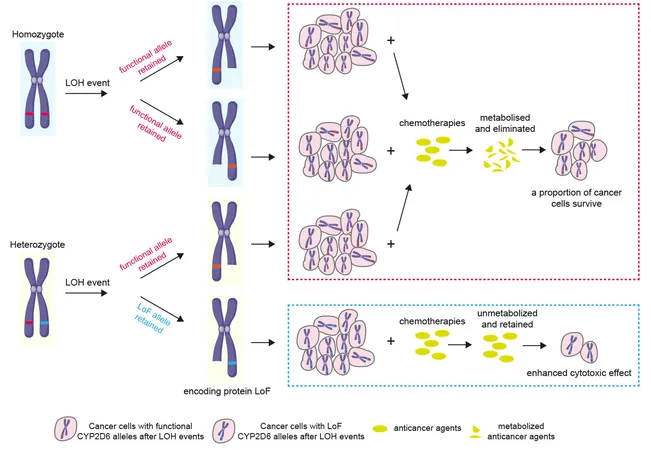
Groundbreaking Study Reveals Genetic Variations Could Revolutionize Cancer Treatment
2024-11-14
Author: Sarah
Introduction
In an astonishing revelation from a recent study at Uppsala University, researchers have found that leveraging genetic variations in cancer cells can significantly enhance the effectiveness of existing cancer medications. Published in the respected journal *eBiomedicine*, this transformative research points towards the future of personalized medicine in oncology, where treatments can be tailored based on a patient's unique genetic makeup.
Understanding Genetic Variations
The human genome comprises 46 chromosomes, with almost all chromosomes (except X and Y in males) present in pairs. When mutations occur in one gene, typically, the second copy serves as a backup. However, during tumor development, a phenomenon known as loss of heterozygosity often leads cancer cells to lose functional versions of genes, retaining only their faulty counterparts.
Key Findings
As explained by Xiaonan Zhang, a researcher at the Department of Immunology, Genetics and Pathology and the study's first author, this loss creates a critical distinction between cancerous and normal cells. “When cancer cells retain the faulty gene, they stop producing the essential proteins that normally play a role in regulating cell growth and death,” Zhang elaborated.
The Role of CYP2D6
In the new study, the research team delved into a wide array of genes, pinpointing one particular gene commonly lost across various cancer types. This gene encodes the enzyme CYP2D6, which is crucial for drug metabolism in the liver. The researchers proceeded to test several drug compounds on engineered cell models to discover the influence of CYP2D6 activity on these drugs' efficacy.
Promising Results with Talazoparib
Among the drugs tested, talazoparib, an already approved cancer medication, emerged as a standout candidate. It demonstrated a significantly enhanced cytotoxic effect against liver cancer cells lacking the functional CYP2D6 enzyme. Excitingly, early unpublished data suggests that talazoparib's benefits may extend to other cancer types such as neuroblastoma and ovarian cancer as well.
Implications for Personalized Medicine
Professor Tobias Sjöblom, who led the study, emphasized the potential of harnessing genetic variations to revolutionize cancer therapies: “By understanding and utilizing loss of heterozygosity and natural genetic variations, we could uncover innovative treatment strategies tailored specifically to the genetic profiles of individual patients.”
Global Collaboration in Research
This research not only has profound implications for the field of oncology but also suggests a broader application of precision medicine across various healthcare domains. Aligning treatments with patients' unique genetic landscapes could lead to the development of more effective therapies, ultimately improving patient outcomes and transforming the approach to cancer care.
Conclusion
The study was a collaborative effort involving researchers from Switzerland and the Chemical Biology Consortium Sweden, highlighting the importance of global cooperation in advancing medical science. As this research initiates a new era of personalized cancer treatments, the promise of precision medicine could reshape the future of healthcare for millions around the world.
Stay tuned as this story unfolds, and explore how understanding genetics might just be the key to tackling one of humanity's greatest challenges!


 Brasil (PT)
Brasil (PT)
 Canada (EN)
Canada (EN)
 Chile (ES)
Chile (ES)
 España (ES)
España (ES)
 France (FR)
France (FR)
 Hong Kong (EN)
Hong Kong (EN)
 Italia (IT)
Italia (IT)
 日本 (JA)
日本 (JA)
 Magyarország (HU)
Magyarország (HU)
 Norge (NO)
Norge (NO)
 Polska (PL)
Polska (PL)
 Schweiz (DE)
Schweiz (DE)
 Singapore (EN)
Singapore (EN)
 Sverige (SV)
Sverige (SV)
 Suomi (FI)
Suomi (FI)
 Türkiye (TR)
Türkiye (TR)